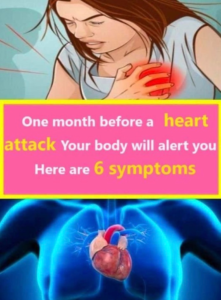

In recent years, heart attack has become number 1 on the list of causes of death.
And it’s no wonder since we live stressful lives and we eat all the junk food that surrounds us.
6 Symptoms of a Heart Attack

Heart health can be protected by changing lifestyle and decreasing stress levels, but what’s even better is if you know the symptoms of heart failure. These symptoms begin to appear about months before the heart experiences failure.
1. Uncomfortable pressure
The very first symptom of a heart attack listed by the American Heart Association is “uncomfortable pressure, squeezing, fullness, or pain in the center of your chest.” This discomfort may come in waves lasting more than a few minutes at a time.
2. Dizziness
It is not normal to feel dizzy all day long, except for pregnant women. A diseased heart is unable to pump enough blood to all of the body’s organs. This poor blood circulation particularly affects the brain which begins to send blatant distress signals.
If you experience dizziness, seek medical attention as soon as possible.
3. Pain or pressure in the chest
Heart problems are generally accompanied by chest pain. The pain generally appears in the form of painful peaks lasting several minutes. If this uncomfortable feeling occurs more and more often and lasts longer each time, you should consult a doctor promptly.
4. Get sick often
You often suffer from colds and flu-like symptoms that you wonder if your immune system is doing well. This wavering state of health can be either:
the sign of serious fatigue and in this case, you would do better to rest to regain your strength; the warning sign of heart problems if it is accompanied by one or more of the symptoms cited in this article.
5. Sweating
Unless you’re going through menopause or have just exercised, breaking out into a cold sweat or perspiring excessively could signal a heart attack. During a heart attack, your nervous system activates a “fight or flight” response that puts you in survival mode and could lead to sweating.
6. Pain in other areas of the body
Heart attack pain can occur in places other than the chest, like the back, shoulders, arms, neck or jaw. According to Cleveland Clinic, when there’s a problem in the heart, such as a blocked artery, it can trigger the nerves in your heart to give a signal that something is wrong, and you’ll feel pain. Considering the vagus nerve is connected to not only the heart, but also the brain, chest, abdomen, and neck, you may feel those pain signals in other areas of the body aside from the heart region.